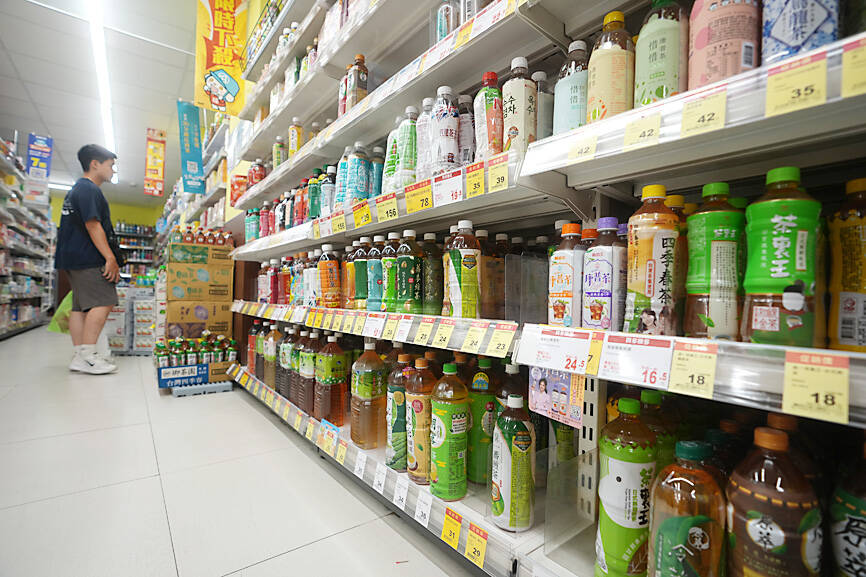The total output value of Taiwan’s non-alcoholic beverage industry grew for a 10th consecutive year last year and surpassed NT$60 billion (US$2.07 billion) for the first time, the Ministry of Economic Affairs (MOEA) reported yesterday.
The sector’s output value hit a record high of NT$61 billion last year, up 3.9 percent from a year earlier, and continued a decade-long upward trend, the ministry said in a report.
In the first four months of this year, non-alcoholic beverage output rose another 2.1 percent from the same period of last year to NT$18.5 billion, the report said.

Photo: CNA
By product category, tea-based beverages remained the leading segment among non-alcoholic beverages, with the output value rising 8.3 percent year-over-year to NT$21.6 billion last year, accounting for 35.5 percent of the sector’s total value, the report said.
The industry is primarily driven by domestic demand, with over 90 percent of products sold in the local market, but firms also import a wide range of non-alcoholic beverages to meet the diverse and changing preferences of Taiwanese consumers, it said.
Those imports totaled US$215 million last year, up 5.2 percent from a year earlier, with US$31 million, or 14.4 percent of the total, coming from Japan, the biggest foreign source of non-alcoholic drinks in Taiwan’s market, the report said.
It was followed by Thailand with US$21 million at 9.9 percent, and China and Hong Kong with US$19 million at 8.9 percent, it said.
In terms of production locations domestically, of the 336 companies in Taiwan engaged in non-alcoholic beverage manufacturing, 55 companies were in Kaohsiung, or 16.4 percent of the total, followed by New Taipei City with 43 companies, Taoyuan with 41 firms and Taichung with 31.
The non-alcoholic beverage industry covers manufacturers of beverages containing no more than 0.5 percent alcohol.
This category includes tea-based drinks, sports drinks, mineral water, carbonated beverages, fruit and vegetable juices, and coffee drinks, according to the industrial classification of the Directorate-General of Budget, Accounting and Statistics.

SEMICONDUCTOR SERVICES: A company executive said that Taiwanese firms must think about how to participate in global supply chains and lift their competitiveness Taiwan Semiconductor Manufacturing Co (TSMC, 台積電) yesterday said it expects to launch its first multifunctional service center in Pingtung County in the middle of 2027, in a bid to foster a resilient high-tech facility construction ecosystem. TSMC broached the idea of creating a center two or three years ago when it started building new manufacturing capacity in the US and Japan, the company said. The center, dubbed an “ecosystem park,” would assist local manufacturing facility construction partners to upgrade their capabilities and secure more deals from other global chipmakers such as Intel Corp, Micron Technology Inc and Infineon Technologies AG, TSMC said. It

NO BREAKTHROUGH? More substantial ‘deliverables,’ such as tariff reductions, would likely be saved for a meeting between Trump and Xi later this year, a trade expert said China launched two probes targeting the US semiconductor sector on Saturday ahead of talks between the two nations in Spain this week on trade, national security and the ownership of social media platform TikTok. China’s Ministry of Commerce announced an anti-dumping investigation into certain analog integrated circuits (ICs) imported from the US. The investigation is to target some commodity interface ICs and gate driver ICs, which are commonly made by US companies such as Texas Instruments Inc and ON Semiconductor Corp. The ministry also announced an anti-discrimination probe into US measures against China’s chip sector. US measures such as export curbs and tariffs

The US on Friday penalized two Chinese firms that acquired US chipmaking equipment for China’s top chipmaker, Semiconductor Manufacturing International Corp (SMIC, 中芯國際), including them among 32 entities that were added to the US Department of Commerce’s restricted trade list, a US government posting showed. Twenty-three of the 32 are in China. GMC Semiconductor Technology (Wuxi) Co (吉姆西半導體科技) and Jicun Semiconductor Technology (Shanghai) Co (吉存半導體科技) were placed on the list, formally known as the Entity List, for acquiring equipment for SMIC Northern Integrated Circuit Manufacturing (Beijing) Corp (中芯北方積體電路) and Semiconductor Manufacturing International (Beijing) Corp (中芯北京), the US Federal Register posting said. The

India’s ban of online money-based games could drive addicts to unregulated apps and offshore platforms that pose new financial and social risks, fantasy-sports gaming experts say. Indian Prime Minister Narendra Modi’s government banned real-money online games late last month, citing financial losses and addiction, leading to a shutdown of many apps offering paid fantasy cricket, rummy and poker games. “Many will move to offshore platforms, because of the addictive nature — they will find alternate means to get that dopamine hit,” said Viren Hemrajani, a Mumbai-based fantasy cricket analyst. “It [also] leads to fraud and scams, because everything is now